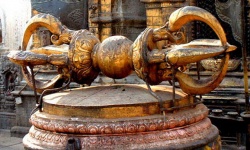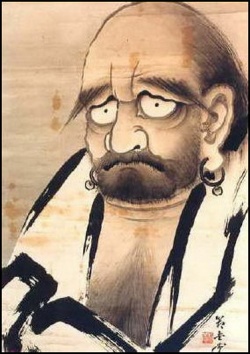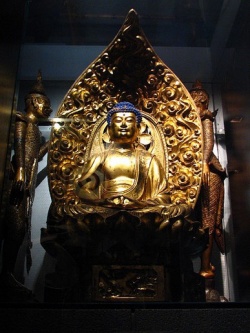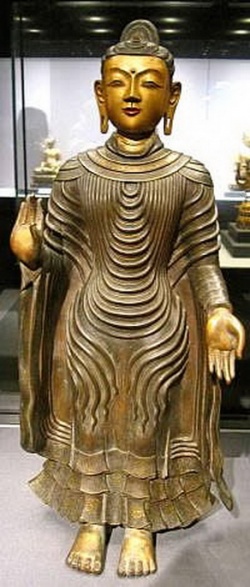The Boat Monk
I love the Zen story of the Boat monk. It expresses the Zen high literary style, and the beauty of the dharma.
Seems that a group of monks attained some degree of the Tao under a famous Zen teacher, Master Yao-shan. One of them was Teh-cheng and his dharma brothers were Yun-men and Tao-wu. Master Teh-cheng knew he didn't have the personality to teach a large number of people or run a monastery, so he told his brothers to send him someone of exceptional talent when they found one rather than open up a teaching center himself.
As is the rule, his job would also be to transmit the dharma to a qualified student if he could find one, but without a teaching center, he had no way to attract a student. Therefore his dharma brothers would have to send someone who had the karmic affinity with Teh-cheng for awakening. So he told them, "You know where I am staying. If you find a student of sharp potential, send him to me so that I may transmit the dharma."
Years later, it just so happened that Teh-cheng's dharma brother Tao-wu was attending a lecture by a famous monk, named Chia-shan, who already had a great following. Chia-shan knew all about the dharma and was extremely eloquent. He could respond to every question with the proper words, and yet he lacked the dharma eye...he lacked any true stage of attainment. Ask him any question and he could respond with the right words ... but without the dharma eye, everything was actually wrong because it could enlighten no one. He knew the words but did not know the real meaning -- he had not achieved it.
His case was like the intellectuals today who study the Bible, Koran, Buddhist sutras, Torah, or any such book or sets of books, know all the perfect words to use so that they sound as if they are in accord with the traditional teachings, and yet everything they say lacks any touch with True Reality. Why? Because those folks have no cultivation attainment themselves. They are dogma literalists rather than enlightened sages. So while they may be intellectually brilliant they are spiritually bereft, and cannot lead anyone to liberation.
That's the state of the world. That's 99.999999999999% of teachers and religious professionals out there.
So while attending the lecture, Master Tao-wu just kept himself quiet and concealed, but he snickered when Chia-shan answered a question correctly ... in order to attract attention. After it was over, Chia-shan respectfully approached master Tao-wu and asked what mistake he had made that his elder had done so.
Tao-wu replied, "You answered correctly, it's just that you've never been taught by a good teacher. I never explain things. If you want to learn, you must go to visit the boatman's place at the city of Hau-ting (where the Boatman Monk Teh-cheng was staying)."
Now because he really was interested in self-improvement, Chia-shan set off right away. This, in itself, shows he was of extraordinary character and not too full of himself. Chia-shan was right in theory, but did not have a real experience of the dharma, yet didn't know it. He thought he was right, but also suspected that he was wrong, that he was missing something though everything he said was correct and according to the scriptures. Amazingly, he was willing to take advice and was anxious to find the answer despite already being established and having a great reputation, so off he went.
Would you do that?
Now at the location, the dharma brother Teh-cheng had settled into a job ferrying people across a river, and had done so for several decades waiting for a good student. No one knew of his high stage of attainment. When the young monk arrived, with one look he knew that he had been cultivating and had some ability, but needed to be awakened to a true direct experience of the dharma. He needed a real, direct experience of the Tao. He knew all the right words, the sutras, the dharma and so forth, but he was clinging to all these explanations and his conceptualizations. He had become an intellectual master rather than reality master. He could not let go of them to realize no-self, no-ego, emptiness. Therefore he had not attained the Tao.
Upon meeting young master Chia-shan, who knew all the correct words but had no direct taste of reality, Teh-cheng opened up the conversation by asking, "What temple do you dwell in, oh virtuous one?"
Chia-shan answered with words that point to the Tao, though of course he did not have that stage of attainment: "I do not dwell in a temple. Dwelling is not like it."
Why did he say this? Because the original nature is not a state, and if you dwell or abide in any state it is NOT the Tao. Chia-shan was saying he understood the Tao by answering in such a way because a regular monk would simply have mentioned the name of his city or monastery.
The boatman then asked, "It is not like what?"
Chia-shan once again correctly answered the correct intellectual response, "It is not the phenomena before our eyes."
Because Chia-shan kept answering correctly, but without without possessing the true dharma experience himself, it was like someone who would respond with the right scriptural retort from the Bible ... though everything said was everything right and you could not find any fault with it, you could tell they were wrong. I'm sure you've had that experience because it is hard to explain.
A little bit disgusted at these canned responses, the Boat monk Teh-Cheng then asked, "Where did you learn all this (way of answering)?"
Chia-shan answered, "It is not something that the eyes or ears can reach," meaning it ultimately comes from the Tao. This time Chia-shan replied in such a way that you could take it as a smirk, with the hidden meaning being, "I know this and you don't? Who are you that you don't know these things?"
With that response, the Boatman monk then uttered a famous line, "A fitting sentence can be a stake that tethers a donkey for 10,000 aeons."
In other words, if you just cling to scripture, or intellectualization, or the words of this or that holy text without arriving at a genuine experience of the true meaning, if you don't experience the original nature, you will tie yourself up in ignorance (non-enlightenment) for aeons and never become free. Why? Because you cling to the intellect, in which case you are wrong. Words will not save you, scripture will not save you. Only cultivation practice and realization will save you!
How many people follow this pattern today? They quote the Torah and cling to it, all the while being correct in words, but WRONG. They cling to the Bible, reciting verses and sentences correctly, and yet they lack any attainment or any means for getting anywhere. They cling to the Koran, the Buddhist sutras, Taoist works and they are all wrong. They never fathom the meaning of the texts. They never reach enlightenment or samadhi or any genuine stage of attainment. They can talk about things all they want, but these are just intellectuals rather than spiritual leaders, people who know a lot about religious things but cannot lead you to the Tao. This is all you find today in churches, temples, mosques and monasteries. No one has the enlightenment eye, or even an inkling that it exists ... and they are even oblivious on how to get there.
"A fitting sentence can be a stake that tethers a donkey for 10,000 aeons" -- Master Teh-cheng was saying that Chia-shan was clinging to the dharma and relying on verbal tricks, and that this was stupid. It would get you absolutely nowhere on the path of true spiritual practice and striving and progress. It was just mental games, verbal tricks and memorization. REAL accomplishment comes from the cultivation practice of letting go and detaching from the realm of mentation to get to the substrate underneath it and EVERTHING.
"A fitting sentence can be a stake that tethers a donkey for 10,000 aeons" ... Chia-shan was stunned at this reply.
Zen master Teh-cheng then said, "The fishing line is hanging down a thousand feet, and the intent is deep in the pond. You're just three inches away from the hook. Why don't you say something?"
He was saying, "You've done so much meditation work your life and are so close you're ready to reach it. Why not say something expressing your original nature?"
Chia-shan was standing there, his mind emptied a bit because of the shock, and was just about to say something intellectual again when the Boat monk hit him with his oar and knocked him into the water.
Wham!
Chia-shan had just been ready to open his mouth again and say something that was in the scriptures when the Boat monk knocked the daylights out of him and he flew into the water.
As soon as Chia-shan's head popped up above the water again, the Boat monk once again shouted, "Speak! Speak!" and just as Chia-shan was about to open his mouth again, Wham! ... the Boat monk hit him again.
Now if you've had any sudden taste of emptiness where everything empties out (a religious experience), you can understand what happened next. Here's a man with a belly full of learning and it's all suddenly knocked out of him. He's been thrown into the water, he's worried for his life, and all his false thoughts have been whacked away.
That's the method the Boat monk used with Chia-shan.
Chia-shan could talk about anything in the dharma ... Consciousness only, the three Buddha bodies, skandhas, True Thusness, prajna wisdom, EVERYTHING. He understand all this but couldn't let go of it, so the Boat monk knocked him into the water to help him let go of everything he was clinging to. Even so, when asked to speak, Chia-shan was ready to spit out the dead scriptural words again, so Teh-cheng hit him again. When for the third time his head rose above the water, this time his mind had emptied out and he and become enlightened, so Chia-shan quickly nodded his head three times in quick succession to show Teh-cheng he had got it and he didn't need to be hit again.
Of course you cannot just hit someone to enlighten them. Don't think it's so easy. Chia-shan not only KNEW the dharma intellectually, but had spent his life meditating and had achieved some degree of emptiness, but just couldn't let go of his intellectualizations to see the path, to see the whole thing. He was close because of his previous attainments in meditation, but still clinging. He already had achieved a deep basis of cultivation beyond just studying, because of prolonged meditation work, and that basis is why Tao-wu sent him to the Boat monk. He was prepared....don't think someone can just whack you or slap you and you get it. Without countless years of meditation work, that would just get you a lawsuit today.
Master Teh-cheng was able to transmit the dharma only because Chia-shan had already spent years mixing practice with study. Master Teh-cheng was able, through the expedient means of whacking him, to help Master Chia-shan let go of everything and see the Path, see the Tao, realize self-enlightenment. If Master Chia-shan had not been a meditator, however, none of this would have been possible. So don't think that just studying scriptures and sutras -- of any kind -- will do it. You have to do the meditation work, open up your chi channels, chakras and so forth. You have to cultivate samadhi, but none of that is the Tao. It's just a preparation because those are all still illusory realms and false stations. They are not ultimate or supreme. They are there to help you clear out in a progressive sense, but when you reach enlightenment there are no stages -- you just let go of everything in one fell swoop. That's why it's called breaking through the conception skandha.
Upon being hit with the oar when in the water, Chia-shan GOT IT. His years of preparation and study, together with the Boatman's excellent skillful means, enabled him to let go, empty out and see the Tao. If you know the theory, that's why the story is so beautiful, so wonderful. But then, while still in the water, Chia-shan asked, "If you throw away the hook and line, what is your intent, teacher?"
In other words, Chia-shan then had doubts and asked about functioning. He was asking, "What about the methods for making an effort in the realm of existence if everything is empty... What do you do about them?"
Master Teh-cheng replied, "The fishing line hangs in the water, floating to set the meaning of existence and non-existence." In other words, don't talk of emptiness and don't talk of existence. Neither is right, and thus you don't cling to either and you can do what you want independently. You are free and liberated. Cause and effect still operates amidst phenomena, but you do not cling to them or the process. You realize the inherent fundamental emptiness of phenomena but you do not cling to it either. You are independent and free.
Master Chia-shan then said, "Words carry the mystery but they have no road. The tongue speaks without speaking." In other words, speaking is the same as non-speaking, emptiness and existence are equivalent to one another.
Master Teh-cheng was VERY happy at hearing this because then he knew Chia-shan had got it. He knew that Chia-shan had finally realized the Truth and was speaking from experience rather than from some scripture he had memorized and studied. So Teh-cheng then said, "After having fished through all these rivers [having piloted this ferry day after day for decades wanting to carry someone over to the other side], I have finally encountered a golden carp (enlightened person].
Chia-shan covered his ears at hearing this, and master Teh-shan said in response, "That's right, that's right!"
Then he told Chia-shan, "From now on you must leave no tracks where you hide yourself. But you must not hide yourself where there are no tracks."
He expressed in a high literary style many meanings: that Chia-shan must continually cultivate that state of no-thought/emptiness he had just achieved wherein there are no tracks. Furthermore, he must go somewhere where no one knew who he was, and leave his fame behind, and thus go into hiding in order to finish his cultivation. He also said that Chia-shan must not remain clinging to emptiness either, for that was also wrong.
The Boat monk then continued, "I was with Zen master Yao-shan for 30 years and I only took away this which you have just experienced/realized. Nothing more. You have just attained it. This is the meaning of all the teachings and nothing more. It's nothing else either than experientially realizing this. In the future you should not live in towns or villages but go deep into the mountains, find one or two people to continue the teaching and do not let it be cut off."
Chia-shan was out of the water by this time, and since the dharma had been transmitted, he started off to return home. The whole thing happened just this quickly, the dharma had been passed, and there was nothing more to be done. But for a moment Master Chia-shan doubted that was all and so he turned around, wandering if there was something else he was missing, if it all came to just this?
Upon seeing this, Zen master Teh-cheng shouted back to him, holding up an oar and saying, "Did you think there was something else?" Then he capsized the boat and disappeared under the water to show there was nothing else. You see, if you cling to all the pageantry of Tibetan Buddhism, you are wrong. It's just an expedient method created to help you REALIZE THIS. If you cling to the Torah or Bible, you are wrong. It's just to help you lay a foundation so you can experientially realize this. Nothing in the universe is absolute. The wind, the rocks, the flowers are all singing the dharma to help you awaken.
The meaning of Christianity, Judaism, Islam, Buddhism, Sikhism, Taoism, Confucianism, yoga, alchemy and all the religions is to realize our fundamental nature. All the ceremonies, scriptures, prayers, and practices are to enable you to experientially realize THIS. That's the purpose of all the scriptures.
What else did you think it was about? Some ceremony or special belief?
Now you finally know. Cultivate!






